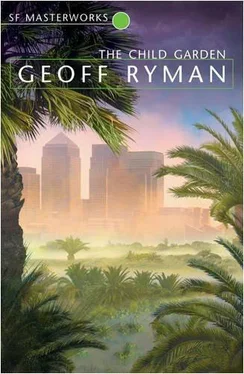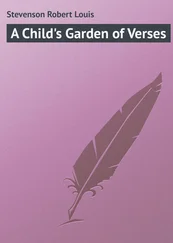The white men carried her into pandemonium.
Bees were pasted, writhing, against the walls of the hospital, held by the tubes. The tubes worked their way blindly along the ground, whiplashing around ankles and arms, hauling Bees up and away in the light from Lucy’s face. Lucy shook her head with a sad smile.
‘Milena!’ the Bees wailed with loss, holding out their arms to her. ‘Don’t go!’
Around the helicopters the Bees had linked arms. Two white men stepped forward. They had things in their hands that looked like frozen lizards. Light leapt from them. The Bees made a sound like falling rain. A passage had been cleared. Briskly, the white men ran, the litter jostling. Deft hands kept tubes in place, deft feet stepped over fallen bodies.
Then a wave of Bees broke around them, hands raised. They struck the Garda full in their clear plastic masks. Both the Garda and the Bees reeled backwards. Any pain the Bees inflicted they also felt themselves. ‘Take the pain. Take the pain,’ they told each other, and broke again against the Garda. A Bee woman was trying to wrest the litter from the grasp of the Garda. She quivered, cowering, hands fluttering, eyes screwed shut.
‘They are taking you! The Consensus wants you. Swallow you!’
All Milena could do was stare, weakly. No, she thought, I don’t want this, no. The cancer in her, hot and heavy and victorious, blazed out at the Bees with terrible life. As Milena came near them, they doubled up or dropped to their knees, as surely as if they had been struck. The woman fell away.
With a wrench and a jostle, Milena felt herself hoisted into the black loading bay. She felt tiny clicks in her spine, as bolts were slid through the supports of the litter, into the floor of the craft, as she was strapped in. The blades overhead began to beat more loudly.
In defeat the Bees began to chant, a chant they had surrendered to silence with Milena’s promise to be with them. Now that she was going, they sang it again.
Milena Shibush
Shibush Shibush
Shibush Cancer
Milena Cancer
Cancer Cancer
Very suddenly, the helicopter left the ground, leaning forward, wafting upwards over the roof of the Tarty flats.
Cancer Flower
Flower Cancer
And old Lucy was singing too:
cosi queste parole segna a vivi
del viver ch ‘e un correre a la morte
so teach them, to those who live the
life that is a race towards death
The roofs of the flats were in slated pinnacles like bare mountains. The sky was full of light, light glowing in the leaves of Eden. The roofs fell away as Rolfa’s music glinted like the light, sparkling, cool music for paradise and the rivers of paradise. The helicopter turned, slanting, and Milena saw far below her the river of London, old Father Thames.
She saw the garden of her life, whole. She saw the Shell, like a series of building blocks, two great wings open in an embrace, with walkways between them, the walkways she had beaten back and forth at such a pace. She saw the Zoo, held up by bamboo, and the steps of the Zoo where she and Rolfa met for lunch and the park on the embankment where they had eaten.
The Cut was gone. The old buildings had finally been torn down, made into rubble. They were growing again in cauliflower shapes of Coral, hard against the old brick bridge. Leake Street was now closed at one end. Everything changes. The Cut was closed and dark, but the old railway bridge was lit and full of traffic. Milena saw the Hungerford Bridge, where she had stood with Berowne to see the lights come back on. It was crowded with people now, looking up, as if at her, as if she was still down there among them. The same lights still hung in a line along the embankment, making the river glow yellow and green. The whole city flickered green, from the light in the sky, from the Comedy.
Milena looked up too, and the garden in the sky was the same as the garden below. Lucy and Dante walked together out of the chasms of light that was Archbishop’s Park.
They walked past Virgil Street, encased in brick. And from somewhere came a ghostly, floating voice. It was Rolfa’s voice singing out memory, singing on the night when Milena had tried to find her, after the Day of the Dogs.
Beatrice and Dante alluded to their old love. Dante sang:
Si come cera da guggello…
Even as wax under the seal that
does not change the imprinted figure,
my brain is now stamped by you.
Rolfa kept singing without words. Her voice would now not leave the rest of the opera, hoarse and enraged, echoing out of Virgil Street. On the Day of the Dogs, Rolfa had been singing the end of the last Canto, alone in the dark.
Elsewhere in the Comedy, Dante was saying that he could not remember that he ever estranged himself from Beatrice or the conscience of having wronged her.
The viruses will know what that means, thought Milena.
He has drunk the waters of Lethe and has forgotten all the wrong he did in life.
He doesn’t remember losing Beatrice. That means losing Beatrice was a sin.
Like my not speaking to Rolfa. Like my not loving her. Milena’s hands were stroking something soft and spilled. Piglet was still in her lap.
And outside the helicopter, on a level with it, were the black balloons that went up from Waterloo Bridge. They were swollen and singing gently to themselves the music they heard. The light reflected on their hides. Faces from memory flickered on their surface.
And the music walked through an Eden that was made of old brick. It spoke of life in the stone, in the ground, in the air. Air moved like the trees and the grass; brick was as solid as stone. It was fulgent and fragrant; even in old London, wafting with history. Touches of minor keys and discords made it disturbing, pained. Odd sour notes glinted like light on falling leaves. The music became an eerie dance, as if, unseen, the Garden was dancing to itself, by itself. The dance was lost to us.
Beatrice and Dante walked across Westminster Bridge Road and into the Cut: the Cut that no longer existed, the Cut in the Summer of Song. There were all the old familiar faces; the boy with the Hogarth face; the slim clothseller and his pretty wife; the seller of mirror lenses. They were a chorus. For the first time, the narrative was sung. They sung about the sun at the meridian, noon on the heights of Purgatory.
In this Comedy, the Pit, the sink of Hell and the heights of the mountain were the same place. Eden and all the other circles up and down overlapped each other in layers, in a world of layers.
Is that plain enough? wondered Milena. Will they understand this Low and earthbound Comedy of mine?
Could I have done Heaven like this, Paradiso? Could I have found heaven on Earth as well? Who will finish the Comedy? Should anyone finish it, or should it exist only in the pages of Rolfa’s book?
Then she thought of little Berry, who sang. He had sung the music of the Comedy before he could speak, as he lay helpless in Milena’s rooms. As if a sword had been jammed into her throat, Milena had the metal taste of certainty. It would be Berry, little Berry. He would finish the Comedy. He would keep it alive. She seemed to see herself passing it to him. What she passed to him was its smallness not its grandness: The Comedy was the size of flower.
She felt herself flush with light. Her whole skin blazed with it. It illuminated the inside of the helicopter. It shone through the open door. The people below saw her in the sky overhead: light in the shape of a woman. There was a roar from below.
A weight was taken off her. The helicopter began to descend.
Читать дальше












